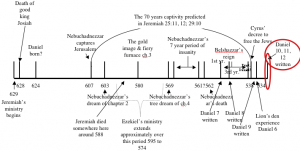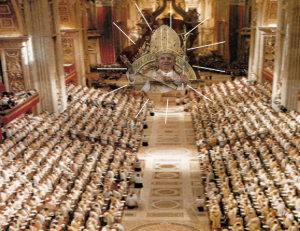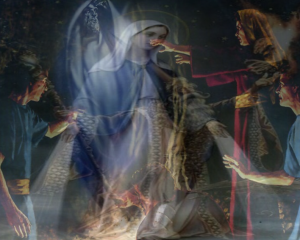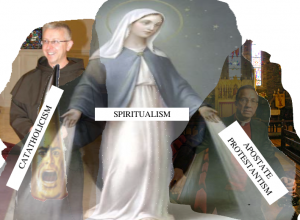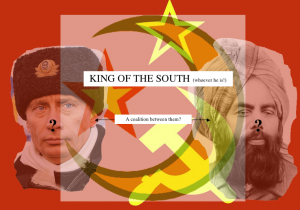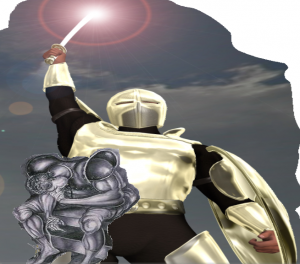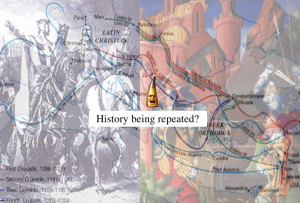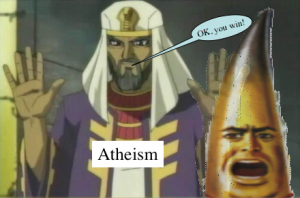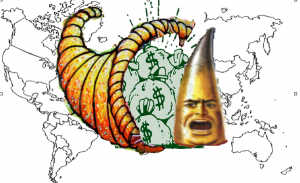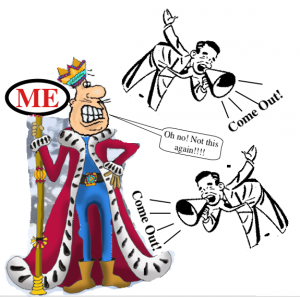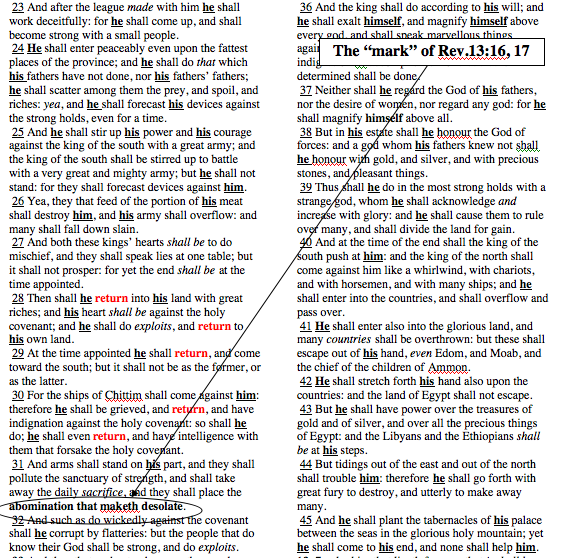Verses 30-35 deal largely with the experience of God’s people after papal Rome’s deadly wound has been healed, but prior to the close of probation. During that time, God’s people, who know their God” and “understand,” will be strong and “do exploits.” Then, in spite of “sword, flame, captivity and spoil,” they will “instruct many” others. Their experience, as difficult and dangerous as it is, will “make them white,” character wise, “even to the time of the end.”
The next ten verses take up where Verses 30 and 31 left off and deal with the concluding scenario of the “vile person’s” evil career.
With so much material in both Daniel and the Revelation concerning this power, we are compelled to conclude that heaven sees not as we see, especially during the comfortable period identified in Revelation as “the church in Laodicea.” To us who feel “rich and increased with goods,” so much angst directed against the papacy seems exaggerated. That is probably one reason why so much warning has been given to us against this power, otherwise we are sure to fall prey to its nearly overwhelming “flood” of false doctrine, coupled with its impressive and glitteringly lavish display of pretended piety.
Since we are living in the last period of earth’s history (known as the “chazown” from our preceding study), we do well to pay close heed to these prophecies, not only for the knowledge they provide, but because they were designed especially for the last church. In fact, it is only the last church that is in position to fully understand them, unlike many of even our earlier pioneers. Having such knowledge will exponentially increase the usefulness of those who heed it, for they will be enabled to give the world a hope which will very soon be desperately needed. At that time, when the world scene will be immersed in darkness deep as midnight, it will surely be good news to the ever-increasing number of those ready to listen.
Verse 36: And the king shall do according to his will; and he shall exalt himself, and magnify himself above every god, and shall speak marvellous things against the God of gods, and shall prosper till the indignation be accomplished: for that that is determined shall be done.
This is the first time a prospective subject for the pronouns “he, his” and “himself” can be identified other than the “vile person” of Verse 21. But what other “king” could “he” be other than the “vile person?” The fact is, there is no other except in Verses 25 and 29 where “he” and “him” struggles with the “king of the south,” leaving only the northern “king,” the “vile person,” to fill the slot.
Smith argues he is “France.” [186] Maxwell strongly believes he “was the medieval papacy!” But while we agree “he” is the papacy, by this time it is clear “he” is the post deadly wound papacy who is having “intelligence with them that forsake the holy covenant,” and who are soon to “place the abomination that maketh desolate,” (Verses 30, 31).
It is also quite clear that “he” is not a secular power because “he” exalts “himself” and magnifies “himself above every god” rather than other nations, indicative of his religious nature. Also, “he” is parallel to the “king of fierce countenance” who “shall magnify himself in his heart” (Daniel 8:23, 25), who, in turn, is parallel to the “little horn” power (Daniel 8:9-13; 7:8, 20-26).
While speaking “marvellous things against the God of gods” could be seen as atheistic dogma, it is essentially the same teachings as the blasphemous horn power who “magnified himself even to the prince of the host . . . and it practiced, and prospered” (Daniel 8:11, 12).
While France has slipped into relative insignificance among world powers, this “king” shall do according to his will . . . and shall prosper till the indignation be accomplished” right up to “the last end of . . . the time appointed” (Daniel 8:19). Then, and only then, Gabriel insists, “that that is determined shall be done” which will take place at “the end of the war [when] desolations are determined . . . and that determined shall be poured upon the desolate” (Daniel 9:26, 27).
Verse 37: Neither shall he regard the God of his fathers, nor the desire of women, nor regard any god: for he shall magnify himself above all.
Who was “the God” of the “vile person’s” “fathers”? It was “the God of gods” depicted in Verse 36 which again shows “him” to be theistic, rather than an atheistic power. But here, being overcome with self-admiration with a “god” complex, he becomes a degraded narcissist.
His disregard for the natural “desire of women” goes way back to the second century when Tertullian “called upon Christians not to allow themselves to be excelled in the virtues of celibacy . . .” [187] or “the regard paid to celibacy and virginity by that power.” [188]
Gabriel again alludes to “his” greatest weakness, that of magnifying himself.” Now he is “above all.” In Verse 36 he was “above every god.” In Daniel 8:25 he only magnified “himself in his heart.” In Daniel 8:11 “he magnified himself even to the prince of the host.” Here, “his” pride carries him “over the top,” so to speak, thinking his power to be unlimited, with one great object in mind―to eradicate the separation between church and state, with himself ruling completely in all the affairs of state, as well as the church, globally.
Verse 38: But in his estate shall he honour the God of forces: and a god whom his fathers knew not shall he honour with gold, and silver, and with precious stones, and pleasant things.
Since Verse 37 says “he” magnifies “himself above all,” who is this “God of forces” that “he” honors “in his estate?” Maxwell asks: “was she not the Blessed Virgin, who, with all her purity and motherly compassion, has often occupied in Catholic devotion a more prominent place than her divine Son?” [189] Since the year 1900 numerous claims for a “Marion Apparition” have been made, some of them witnessed by crowds of people. [190]
Interestingly, “it was not until 1854 that Pope Pius IX, with the support of the overwhelming majority of Roman Catholic Bishops, whom he had consulted between 1851 and 1853, proclaimed the doctrine [of Mariology] in accordance with the conditions of papal infallibility that would be defined in 1870 by the First Vatican Council.” [191] Therefore, it appears this was a doctrine or a “god whom his fathers knew not.”
It seems more than coincidental that one of the first apparitions occurred in Fatima, Portugal, May 13, 1917 [192] and that “Fatima . . . was a daughter of the Islamic prophet Muhammad from his first wife Khadija.” [193]
Even more significantly, “The Moors once occupied Portugal. The village of Fatima was given the Islamic name of the well-loved Princess of the nearby Castle of Ourem. She died at an early age after marrying the Count of Ourem and converting to Catholicism. Baptized with the Christian name of Oureana, she was named at birth ‘Fatima,’ like many other Moslem girls, in honor of the daughter of Mohammed. Of his daughter, Fatima, the founder of Islam, Mohammed, said: ‘She has the highest place in heaven after the Virgin Mary.’
“It is a fact that Moslems from various nations, especially from the Middle East, make so many pilgrimages to Our Lady of Fatima’s Shrine in Portugal that Portuguese officials have expressed concern. The combination of an Islamic name and Islamic devotion to the Blessed Virgin Mary is a great attraction to Moslems. God is writing straight with crooked lines, as we will see. Fatima is a part of Heaven’s Peace Plan. It is hope for the world” [194] ―it is claimed. Could that be the common ground upon which the last day kings of the north and south will unite for a brief time as suggested in verse 29?
But this doctrine has even deeper significance, for the Marion Apparitions are not Mary at all. She is still in her grave awaiting the resurrection. So, who is the real “apparition?” It is the devil who craves worship in the form of occultism, spiritism, paganism or eastern mysticism in general. Therefore, it is little wonder that the “vile person” has embraced Mariology.
Verse 39: Thus shall he do in the most strong holds with a strange god, whom he shall acknowledge and increase with glory: and he shall cause them to rule over many, and shall divide the land for gain.
This “strange god” must be “the god of forces whom his fathers knew not” (Verse 38) which is “spiritualism,” with the Marion Apparitions being only one of its many miraculous manifestations. These are the things “he” will “do” even in the most powerful nations on earth, just as he did “upon the fattest places of the province” during the Dark Ages (see Verse 24). Note that “he,” the “vile person,” “shall acknowledge” or “recognize” the “strange god” suggesting that the “Protestants of the United States [the “forsakers” of Verse 30] will be foremost in stretching their hands across the gulf to grasp the hand of spiritualism; they will reach over the abyss to clasp hands with the Roman power; and under the influence of this threefold union, this country will follow in the steps of Rome in trampling on the rights of conscience.” [195] But, he will “greatly honor those who acknowledge him” and make “them rulers over many people.” (NIV)
Then, Gabriel declares, he (the “vile person”), under the power of the “strange god” [threefold union?] “shall divide the land [196] for gain” [197] meaning, in the ultimate sense, polarization of the whole world by rewarding with “gain,” those who cooperate with him.
Centuries later, Gabriel told John the same thing: “he causeth all, both small and great, rich and poor, free and bond, to receive a mark in their right hand, or in their foreheads: And that no man might buy or sell, save he that had the mark, or the name of the beast, or the number of his name” (Revelation 13:16, 17). In other words, “he” will disenfranchise all who refuse “his” identifying “mark,” evidently by confiscating (or “spoil” and plunder as in Verses 24 & 33) all their material possessions.
Verse 40: And at the time of the end shall the king of the south push at him: and the king of the north shall come against him like a whirlwind, with chariots, and with horsemen, and with many ships; and he shall enter into the countries, and shall overflow and pass over.
Interestingly, the phrase “time of the end” appears only in Daniel 8:17; 11:35, 40; 12:4 and 9. It is found nowhere else in the Bible! Therefore, this is a very special revelation which deserves close study. At this point, let’s confine ourselves to Daniel 8:17 as well as Verses 35 and 40 of this chapter.
In Daniel 8:17, Gabriel, after being instructed (Verse 16) to “make [Daniel] to understand the vision [2300-day mar’eh],” explained: “at the time of the end shall be the vision [chazown].”
As we remember, the “chazown” extends beyond the 2300 day “mar’eh” by an indeterminate number of “days.” That is what Gabriel says (Daniel 8:26) where “the vision [mar’eh] of the evening and the morning [198] which was told is true: wherefore shut thou up the vision [chazown]; for it shall be for many [or more (rab)] days [yowm]” [199] beyond the “mar’eh.”
Then Daniel said “he understood the thing (Daniel 10:1), and had understanding of the vision [mar’eh].” But, in Daniel 10:14, when Gabriel said “I am come to make thee understand what shall befall they people in the latter days: for yet the vision [chazown] is for many [more] days” beyond the “mar’eh,” [200] Daniel almost had a stroke!
From that standpoint alone, Gabriel, from Verse 30 and onward in Chapter 11, has probed deeply into the post “deadly wound” career of the “vile person,” with much of it future.
Here, with “the king of the south” pushing [201] “at” the “vile person,” who is ostensibly “the king of the north,” it seems as though the southern “king” is deliberately goading the “vile person” into retaliation. Note that the “vile person” previously came “toward the south” in peace (Verse 29). Thus, the brief period of peace between the “king of the south” and the “king of the north” comes to an end.
Going back to Verse 35, where “the time of the end” appears for the second time, Gabriel puts us on notice that the little time of trouble (when “sword, flame, captivity, and spoil” {Verse 33} will afflict “them of understanding”) will last “to the time of the end,” suggesting it will cease (or, at least be abated somewhat) sometime prior to the very end of time.
Now, in Verse 40, Gabriel seems to be describing a pitched battle with the “king of the south” pushing at “the king of the north” “at the time of the end.” If retaliation is what the southern king wanted, he will get his wish, because “the king of the north shall come against him” with overwhelming force, even to the point of overflowing and passing over him.
Therefore, it seems, this pitched battle causes the “vile person” to redirect his “sword, flame, captivity and spoil” away from those “who understand” (Verse 33), and (in the form of “a whirlwind, chariots, horseman” and “many ships”) against the “king of the south” who turned against him by pushing “at him.”
Is there a parallel to this in the book of Revelation? Yes, there is. It is found in the fifth and sixth trumpet scenarios of Revelation 9.
Verse 41: He shall enter also into the glorious land, and many countries shall be overthrown: but these shall escape out of his hand, even Edom, and Moab, and the chief of the children of Ammon.
Keep in mind, as amazing as it may seem, “he” and “his” in this verse are still references to the “vile person” of Verse 21 who represents the papacy. It should also be clear, at this point, that “he” is the post “deadly wound” (see Verse 26) papacy, who, with the help of the forsakers, has “placed the abomination that maketh desolate” (Verses 30, 31) and is, by now, fully recovered from his “deadly wound” (Verse 26). [202]
Now, following “his” overwhelming victory over the “king of the south,” we find him finally entering “into the glorious land,” the same place he stirred “up his power and his courage against” during the Crusades (Verse 25). Now, in contrast to his previous failure, he finally conquers Palestine where “many countries [203] shall also be overthrown” including, we can assume, all the middle eastern countries, perhaps even Arabia, that have been giving the west so much trouble.
But, as Maxwell declares, the “last of these verses . . . parallels in part the career and demise of Roman Christianity” with its “greatest fault” being obscuring “the work of Jesus Christ in the heavenly sanctuary. . . It is scheduled [according to Daniel 7:11] to have ‘its body destroyed and given over to be burned with fire.’ For ‘the court shall sit in judgment, and his dominion shall be taken away, to be consumed and destroyed to the end.’” [204]
In the meantime, it will have invaded Palestine and, perhaps, all the Middle Eastern countries along with it except for “Edom, Moab, and the chief of the children of Ammon” who escape “out of his hand.” Are these literal countries, or are they figurative of the descendants of Edom, Moab and Ammon? Daniel, who was thoroughly familiar with the history of Israel and understood they numbered among the most bitter of Israel’s enemies, must have been greatly surprised when he heard Gabriel predicting their “escape.” In the past, “desolation” was prophesied against “Edom” (see Ezekiel 25:13; Jeremiah 49:17 and Joel 3:19). “Moab” was “subdued . . . under the hand of Israel” (Judges 3:30), and the “children of Ammon” were also “subdued” by “the children [205] of Israel” (Judges 11:33) long before the time specified here.
But, “in the latter days,” people who, from all appearances, are the most unlikely candidates for the kingdom of God, will “escape” the hand of Satan because “the LORD seeth not as man seeth; for man looketh on the outward appearance, but the LORD looketh on the heart” (1 Samuel 16:7). Therefore, says the Lord: “In that day will I raise up the tabernacle of David that is fallen, and close up the breaches thereof; and I will raise up his ruins, and I will build it as in the days of old: That they may possess the remnant of Edom, and of all the heathen, which are called by my name, saith the LORD that doeth this” (Amos 9:11,12). “Yet will I bring again [206] the captivity of Moab in the latter days, saith the LORD” (Jeremiah 48:47). “And afterward I will bring again the captivity of the children of Ammon, saith the Lord” (Jeremiah 49:6).
So, it is people, not nations, that are represented figuratively by “Edom, Moab and the chief of the children of Ammon.” But what kind of people? ―possibly those coming from “the highways and hedges” of the world, “the wayfaring men, though fools” will follow “the way of holiness,” spiritually make their escape from the “vile person” and fill the “house” of the Lord (from Isaiah 35:8 and Luke 14:23).
“Those whom Christ commends in the judgment, may have known little of theology, but they have cherished His principles. Through the influence of the divine Spirit they have been a blessing to those about them. Even among the heathen are those who have cherished the spirit of kindness; before the words of life had fallen upon their ears, they have befriended the missionaries, even ministering to them at the peril of their own lives. Among the heathen are those who worship God ignorantly, those to whom the light is never brought by human instrumentality, yet they will not perish. Though ignorant of the written law of God, they have heard His voice speaking to them in nature, and have done the things that the law required. Their works are evidence that the Holy Spirit has touched their hearts, and they are recognized as the children of God.” [207]
Verse 42: He shall stretch forth his hand also upon the countries: and the land of Egypt shall not escape.
Interestingly, the words “countries” and “land” are translated from the same word “’erets” [208] which can be understood as “the whole earth” with particular reference to the country “of Egypt.” But, as we’ve seen, the context has projected us into the near future when, at least in our time, the “land of Egypt” has sunk far below the Pharaohs and Ptolemies of the past and well down into third world insignificance. So, why did Gabriel make mention of that country here?
It seems that “Egypt,” instead of being representative of the literal country of Egypt, as in Verse 8, like “Edom, Moab” and the “children of Ammon,” is figurative of the mindset of a certain category of people, who, in spite of their distaste for the “vile person,” are unable to resist his power. With that thought in mind, they could well be related (philosophically, at least) to the “king of the south” who pushed “at . . . the king of the north” (Verse 40).
If we reflect on the thoughts that could have coursed through Daniel’s mind when Gabriel referred to the “vile person’s” capture of “the land of Egypt,” he could well have reflected on the story of Moses and his relationship to king Pharaoh. “No monarch ever ventured upon more open and high-handed rebellion against the authority of Heaven than did the king of Egypt. When the message was brought him by Moses, in the name of the Lord, Pharaoh proudly answered, ‘Who is Jehovah, that I should obey his voice to let Israel go? I know not Jehovah, neither will I let Israel go.’ This is atheism; . . .” [209]
If “atheism” can be taken as the philosophy represented by the “land of Egypt,” Russia would be an outstanding example of an atheistic nation in our day. If that is the case, that far eastern country, as well as the middle east, will be victimized by the “vile person” in conjunction with “them that forsake the holy covenant.” Amazing!
Verse 43: But he shall have power over the treasures of gold and of silver, and over all the precious things of Egypt: and the Libyans and the Ethiopians shall be at his steps.
In Daniel’s day Egypt was noted for its great wealth. While Daniel probably knew a lot about the Libyans and the Ethiopians of his day, little is known today. Nevertheless, it appears this verse, in symbolic language, is referring to “the fattest places of the province” and “the most strong holds (Verses 24 & 39; of the whole “world,” in this case)” represented by the wealth of “Egypt,” and those less prosperous like the figurative “Libyans and the Ethiopians” who, nevertheless, will be obliged to submit to the “vile person.”
Evidently, upon his successful invasion of figurative Egypt, Libya and Ethiopia, after he came against the king of the south “like a whirlwind, with chariots, and with horsemen, and with many ships” (Verse 40), his wealth will swell to unimaginable proportions. In other words, the “vile person,” like the “king of fierce countenance . . . shall prosper and practise” (Daniel 8:23, 24) “till the indignation be accomplished: for that that is determined shall be done” (Verse 36).
It seems the retaliation of the “king of the north” against the “king of the south” (as noted in Verse 40) will trigger a train of events leading to the establishment of a one-world government under the dominion of the “vile person.” Money will give him enormous power and prestige, especially when the rest of the world lies in poverty.
Verse 44: But tidings out of the east and out of the north shall trouble him: therefore he shall go forth with great fury to destroy, and utterly to make away many.
This verse appears to take us back to the scenario of Verses 32 to 35 where “the people that do know their God shall be strong, and do exploits.” They must be those who proclaim the “tidings out of the east.” Since these “tidings” upset the “vile person” so greatly, these “tidings” must have something to do with the “holy covenant” that caused him so much grief back in the Dark Ages when “the ships of Chittim” (Verse 30), the people from the west, came “against him.” This verse strongly suggests the trials experienced by “sword, flame, captivity” and “spoil” (Verse 33) are the means the “vile person” (“king of the north”) employs to “destroy, and utterly to make away many.” Note that last word “many” [210] in this verse. It denotes the same multitude that was instructed by “they that understand among the people” (Verse 33).
But, what about the “tidings out of . . . the north,” the “vile person’s” domain? Obviously, they do not make him feel any better! Quite likely, it is bad news for the “vile person,” for it implies that “he” suffers a severe loss of “his” previously devoted followers in “the north” who, hearing the “tidings out of the east,” cast their lot with “them than understand” the prophecies of Daniel [211] and the “holy covenant” that was understood by their forefathers of the Great Reformation of the sixteenth century. Consequently, they turn their backs on the “vile person.”
“Notwithstanding the spiritual darkness and alienation from God that exist in the churches which constitute Babylon [the domain of the “vile person”], the great body of Christ’s true followers are still to be found in their communion. There are many of these who have never seen the special truths for this time. Not a few are dissatisfied with their present condition, and are longing for clearer light.” [212] “Now the rays of light [the ‘tidings out of the east’] penetrate everywhere, the truth is seen in its clearness, and the honest children of God sever the bands which have held them. Family connections, church relations, are powerless to stay them now. Truth is more precious than all besides. Notwithstanding the agencies combined against the truth, a large number take their stand upon the Lord’s side.” [213]
Verse 45: And he shall plant the tabernacles of his palace between the seas in the glorious holy mountain; yet he shall come to his end, and none shall help him.
Note the five personal pronouns “he, his, he, his” and “him” all pointing back to the “vile person” (Verse 21), and also called “the king” (Verse 36) and “the king of the north” (Verse 40).
Although the end time application of Verses 31 to 44 remains unrecognized by most, “In general, Seventh-day Adventists have held that the fulfillment of v. 45 is yet future.” [214] While the Commentary attempts little in the way of interpretation, Maxwell writes: “The ‘glorious holy mountain’ appears to be a metaphor for the Jerusalem temple which, in turn, symbolizes the heavenly sanctuary. Pitching ‘palatial tents’ between the Mediterranean Sea and the Jerusalem temple symbolizes the encroachment of the king of the north on the prerogatives of Christ’s sanctuary ministry. As a consequence of this encroachment the king of the north will be punished so that, like the little-horn animal of Daniel 7 that he parallels, he will ‘come to his end, with none to help him.’ The little horn-power and the king of the north seem to represent the same earthly power.” [215]
Maxwell’s metaphorical interpretation finds confirmation in Daniel 8:11, 12, and 25 where the “little horn” and its parallel, the “king of fierce countenance,” “magnified himself even to the prince of the host, and by him the daily . . . was taken away, and the place of his sanctuary was cast down. And an host was given him against the daily . . . by reason of transgression, and it cast down the truth to the ground; and it practised, and prospered. . . and he shall magnify himself in his heart, and by peace shall destroy many: he shall also stand up against the Prince of princes; but he shall be broken without hand.”
Gabriel seems to be saying that the “vile person” will actually establish his “tabernacles,” or “dwelling place,” in Jerusalem. ? Remember the slogan “from the River to the Sea” ―to destroy Israel―accepted terminology for Jerusalem’s location between the Jordan River/Dead Sea and the Mediterranean Sea.
But how does the “king of the north” come to his end, as Gabriel predicted in this verse? Judging from Daniel 7:11, where Daniel beheld “till the beast was slain, and his body destroyed, and given to the burning flame,” his end will be a violent one. So, a literal application is not only possible, but likely.
Consider this overview, covering Verses 21 to 45, including Daniel 12:7. Note the personal pronouns “he, him, his, himself” all refer to the “vile person” of Verse 21, how he behaves and what will happen to “him.”:

Now, consider this:
Next, check this out:
Next:
But, there is more:
Finally:
Summary of Verses 36-45: The previous section of Chapter 11 ended with God’s faithful people undergoing the trials and tribulations of a future Dark Age after the ‘abomination that maketh desolate” is set up. This section alludes to the self-centered mindset of the “vile person” and the degree of dominance he has and will exert, even to the point of polarizing the whole world “for gain,” a paradigm likely parallel to the economic boycott seen in Revelation 13:17. But it will not be without opposition from the southern “king” who goads him into retaliation much like we see depicted in Revelation 9. Then, Gabriel alludes, retrospectively, to an earlier time when the “vile person” had to face the “tidings out of the east” that, because of his past history dealing with the Protestant Reformation, whips him into fury. Nevertheless, he will “come to his end.”
———————————————————————————————————————————-
[186] The Prophecies of Daniel and the Revelation by Uriah Smith, page 281 / see God Cares by Mervyn Maxwell, Vol. 1, page 296 / Seventh-day Adventist Bible Commentary, Vol. 4, page 875
[187] http://en.wikipedia.org/wiki/Tertullian.
[188] see Seventh-day Adventist Bible Commentary, Vol. 4, page 876 (left column top)
[189] God Cares by Mervyn Maxwell, Vol. 1, page 296
[190] http://www.miraclehunter.com/marian_apparitions/unapproved_apparitions/
[191] See http://en.wikipedia.org/wiki/History_of_Roman_Catholic_Mariology / the sentence just before “Mariology in the 20th century.”
[192] http://www.crystalinks.com/fatima.html
[193] http://en.wikipedia.org/wiki/Fatimah
[194] http://www.ewtn.com/library/mary/olislam.htm (this site no longer exists/2022) Try: https://www.irishcatholic.com/the-surprising-connection-between-our-lady-of-fatima-and-islam/
[195] The Great Controversy by E.G. White, page 588 (bracket & italics mine)
[196] “land” from “’adamah” (Strong’s #127) ground, earth substance, territory, whole inhabited earth”
[197] “gain” from m@chiyr (Strong’s #4242) “price, hire, reward”
[198] Remember, the word “days” in Daniel 8:14 is translated from two Hebrew words “er’eb” (evening) and “boqer” (morning) the same words for “evening and the morning” in Daniel 8:26.
[199] “days,” here is from “yowm” (Strong’s #3117) whereas “days” in Daniel 8:14 is from “’ereb boqer”
[200] Note that “many” is italicized and therefore supplied, Nevertheless, it agrees with the proper word “many” in Daniel 8:26 where it is translated from “rab” meaning “more.” That is why I used [more] in brackets.
[201] “push” is from the Hithapael form of “nagach” (Strong’s #5055) “to engage in thrusting, wage war”
[202] Interestingly, the Commentary, after alluding to “the career of France during the Revolution” and “Turkey” as “the king of the north of vs. 40-45,” and mention that some “apply vs. 36-39 to the papacy,” has no further comment regarding verses 41 to 44. (Seventh-day Adventist Bible Commentary, Vol. 4, page 877)
[203] Even though “countries” is supplied, to my mind, it makes sense to retain it.
[204] God Cares by Mervyn Maxwell, Vol. 1, pages 296, 297
[205] Interestingly, the word “robbers,” in Daniel 11:14 is translated from “ben” (Strong’s #1121), the same word translated “children” in Daniel 11:41.
[206] “bring again” from the Qal of “shuwb” (Strong’s #7725) “turn back, return, come or go back, turn back to God, turn back from evil” etc.
[207] The Desire of Ages by E.G. White, page 638
[208] “’erets” (Strong’s #776), found some 2504 times in the OT is literal for “whole earth, territory, district, region, piece of ground” etc.
[209] The Great Controversy by E.G. White, page 269 (underlining supplied). Although the context deals with the French Revolution, the concept seems to coincide with a last day application to the atheistic mind set of many people, Russia being an outstanding example.
[210] “many” from “rab” (Strong’s #7227) “much, many, great, abounding, more, abundant, more numerous than, much, exceedingly” etc. suggesting the possibility of a “great multitude” who will heed these “tidings”
[211] At this point it was very tempting to add “Revelation” because it seems clear these “tidings” are the three angel’s messages of Revelation 14:6-12. But, that would be a bit premature. We will study that connection when we reach Revelation 14.
[212] The Great Controversy by E.G. White, page 390 (brackets and italics supplied)
[213] Ibid page 612 (brackets and italics supplied)
[214] Seventh-day Adventist Bible Commentary, Vol. 4 page 877
[215] God Cares by Mervyn Maxwell, Vol. 1, page 297
[216] “seas” from “yam” (Strong’s #3220) “Mediterranean Sea, Red Sea, Dead Sea, Sea of Galilee, sea (general), mighty river (Nile); the sea (the great basin in the temple court); seaward, west, westward”
[217] according to the Online computer Lexicon, “yam” is translated: “sea 321, west 47, westward 21, west side 4, seafaring men 1, south 1, western 1” for a total of “396” West: 47 + 21 + 4 +1 = 73
[218] “tabernacles” from “’ohel” (Strong’s #168) “tent, dwelling, home, habitation, sacred tent”
[219] How can the “vile person” set up his “tabernacles” in Jerusalem “after” he is given to the burning flame? The answer is much too complicated to address at this point. But, when our study reaches Revelation 8, 17 & 18, it will become clear.
